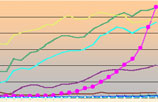钱荒 (qian huang): Cash crunch
(China Daily) Updated: 2013-06-28 08:33On June 20, the benchmark lending rate in Shanghai soared to a record 13.44 percent, causing concerns over the health of the Chinese economy and financial system. The record increase in inter-bank lending rates means China is facing a "cash crunch", with banks and other lenders scrambling for funds but being reluctant to borrow.
With the easing of inter-bank interest rates this week, the cash crunch in the inter-bank market - where banks borrow from each other - has sent the Chinese stock market tumbling. Experts, however, say the cash crunch is temporary and attribute it to the structural liquidity shortage caused by a mismatch of funds. In fact, China is not short of funds; it's just that the money is not in the right place.
On Monday, responding to the liquidity squeeze, the central bank declared that current bank liquidity conditions were overall at a reasonable level, and that all financial institutions should strengthen liquidity management to promote stability in the monetary environment. Commercial banks were advised to keep sufficient debt coverage ratio to ensure regular payments and settlements.
But on Wednesday, the central bank declared that it had already provided liquidity support to some financial organizations. This move, industry insiders reckon, is aimed at guiding the credit in the market to the real economy in order to reshape the country's economic structure, which will help achieve more sustainable development.











